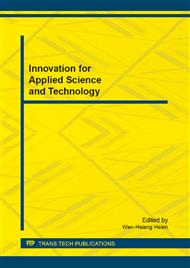[1]
Ren Z.W., San Y., and Chen J.F., Hybrid Simplex-improved Genetic Algorithm for Global Numerical Optimization, Acta Automatica Sinica, (2007), Vol. 33, pp.91-96.
DOI: 10.1360/aas-007-0091
Google Scholar
[2]
Hooke, R. and T.A. Jeeves, Direct Search Solution of Numerical and Statistical Problems, Journal of the Association for Computing Machinery, (1961), Vol. 8, pp.212-229.
DOI: 10.1145/321062.321069
Google Scholar
[3]
Holland, J.H., Adaption in Natural and Artificial Systems, The University of Michigan Press, (1975).
Google Scholar
[4]
Jong, KA De, An analysis of the behavior of a class of genetic adaptive systems, Ph. D. Dissertation, University of Michigan, Ann Arbor, (1975).
Google Scholar
[5]
Goldberg, D.E., Genetic Algorithms in Search, Optimization and Machine Learning, Addison Wesley, Reading, MA, (1989).
Google Scholar
[6]
Goldberg, D.E., Real-coded genetic algorithms, Virtual alphabets, and blocking. Complex Systems, (1991), Vol. 5, p.139–167.
Google Scholar
[7]
R. G. Reynolds, An introduction to cultural algorithms, in Proc. 3rd Ann. Conf. Evolutionary Programming, A. V. Sebald and L. J. Fogel, Eds. River Edge, NJ: World Scientific, (1994), p.131–139.
Google Scholar
[8]
Steward, J.H. Theory of Culture Change, Urbana, University of Illinois Press, (1955).
Google Scholar
[9]
Edward O. Wilson, Sociobiology: The New Synthesis 1975, Harvard University Press, Twenty-fifth Anniversary Edition, (2000).
Google Scholar
[10]
Edward O. Wilson, Consilience : The Unity of Knowledge, Random House, (1999).
Google Scholar
[11]
Storn, R. and K. Price, Differential Evolution- A Simple and Efficient Heuristic for Global Optimization Over Continuous Spaces, Journal of Global Optimization, (1997), Vol. 11, pp.341-359.
DOI: 10.1023/a:1008202821328
Google Scholar
[12]
Jakob Vesterstrom, Rene Thomsem, A Comparative Study of Differential Evolution, Particle Swarm Optimization, and Evolutionary Algorithms on Numerical Benchmark Problems, IEEE, (2004).
DOI: 10.1109/cec.2004.1331139
Google Scholar
[13]
Adnan A. and Akin G., Enhanced Particle Swarm Optimization Through External Memory Support, IEEE, (2005).
Google Scholar
[14]
Kusum Deep, and Manoj Thakur, A new mutation operator for real coded genetic algorithms, Applied Mathematics and Computation, (2007), Vol. 193, pp.211-230.
DOI: 10.1016/j.amc.2007.03.046
Google Scholar


